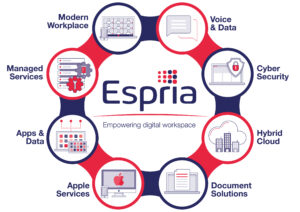In a recent report, Gartner commented that worldwide end-user spending on public cloud services is forecast to grow 20.4% in 2022 to total $494.7 billion, up from $410.9 billion in 2021. In 2023, end-user spending is expected to reach nearly $600 billion.
Certainly, the pandemic accelerated the adoption of cloud services as people digitally transformed their businesses in a matter of a few weeks in order to accommodate the way we needed to work remotely. However, this acceleration has not eased as businesses grapple with a workforce that still wants to work flexibly and remotely.
“Cloud is the powerhouse that drives today’s digital organizations,” said Sid Nag, research vice president at Gartner. “CIOs are beyond the era of irrational exuberance of procuring cloud services and are being thoughtful in their choice of public cloud providers to drive specific, desired business and technology outcomes in their digital transformation journey.”
So, desire to implement cloud services has not declined since the end of the pandemic but continues to gather pace and Gartner further commented that by 2025 80% of enterprises shut down their own data centres in favour of the cloud.

Right now, businesses need to solve the following problems:
1. Security
2. High technical workloads
3. Scalability
4. Speed of execution
Cloud services ticks these boxes with the ability to plug the cloud into your servers via the internet and as a result the desire to implement this continues to increase.
What are cloud services?
Cloud services encompass a multitude of services:
• Cloud
• Platform as a Service (PaaS)
• Infrastructure as a Service (IaaS)
From supporting your cyber security requirements to protect the whole perimeter of your solutions, to Unified Communications, VoIP phones, to Document Management platforms that digitally manage your workflow, to cloud printing to support mobile printing, cloud services offer ultimate fluidity in your business operations and the security and flexibility you need.
The Benefits of Cloud Services
- High Level of Performance
With faster network bandwidths to multiple users and low latency, cloud services offer high levels of service and performance with latest technology.
- Security for your Data
With the increase of cyber criminals as a result of flexible working, businesses have recognised that implementing cyber security is imperative. However, moving to cloud services reduces the risk of attacks because cloud providers add security and compliance measures to their systems to not only reduce the security workloads of your teams, but offers the highest level of security.
Not only that, but cloud services also offer continuous monitoring, meaning that if you are using a cyber managed services provider, you needn’t worry about those threats!
- Agility in deployment
Cloud can be deployed within a matter of days and can be integrated and tested quickly. Updates, delivery of products and ultimately your customer services, are delivered faster and more efficiently.
- Scalability
Cloud Services are exceedingly flexible with an infrastructure that means you can scale at ease. If you need to increase services as a result of demand, then this can be accommodated automatically and then scaled back down should you no longer need the increased service.
This also supports a reduction in management tasks, meaning a reduction in costs, so the flexibility that cloud services provides means scalability is no longer an issue.
- Productivity and collaboration
Enhancements in productivity are endless with cloud services, as your teams can access data in real time. Forbes produced a survey that indicated that 87% of business leaders said that the cloud offered a breakthrough in collaboration.
Your IT teams’ pressure of time is alleviated as they no longer have to manage servers; instead they can focus on other key IT Business goals. Customer service levels are significantly increased because of the huge improvements in collaboration that supports higher levels of productivity and customer services.
- Remote Access & Availability
In-house data centres restrict the access to the one location as data can only be stored on the hard drives.
With Cloud Services remote access is completely accessible. New applications can be tested and deployed through mobile devices so cloud services are ideal for remote workers.
- Disaster Recovery
With faster recovery rates after a data breach, cloud services are ideal in the event of a disaster; If one server fails, it is replaced by another in the data centre – because your data is backed up by several servers you never lose time.
Traditional data storage is complicated should you experience a disaster, and the recovery phase is long-winded, so the impact on your business is exceedingly detrimental.
Continuous up time is important for any size of business, but cloud services allow ultimate speed in your recovery.
- Cost-Effectiveness
With flexible pricing, and huge cost savings when moving to the cloud, it seems ridiculous to not implement this service!
With no legacy hardware for your IT teams to deal with, IT consider the Cloud as imperative to businesses as they can divert their IT budgets to other projects.
Effectively, you are renting servers, so your operational and capital expenses are significantly reduced.
- Innovation
Faster innovation, with access to the most up to date technology and security, the Cloud allows your business to embrace the digital transformation with ease.
Using the cloud allows you access to better solutions and receive the automation and insights that support your business operations. You can then use these tools to create a better customer experience. Not only that, but you are also actually reducing your carbon footprint, supporting the need to improve your consumption of energy.
- Gain the edge
Companies that implemented the cloud gained a 53% faster revenue growth according to Dell Technologies. Businesses that do not use Cloud Services are at a disadvantage because those in the cloud are more productive, more fluid and more reactive.
Most businesses recognise the multitude of benefits to cloud services for scalability and productivity and cost effectiveness for your business. Why not take a look here and see how Espria can support your digital transformation?


